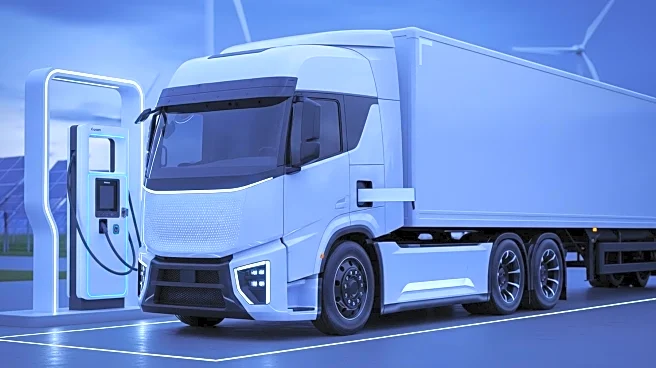What's Happening?
The global freight trucking industry is witnessing a significant shift towards battery-electric vehicles, as evidenced by recent data from the BloombergNEF 2025 Factbook. In the first half of 2025, nearly 90,000 zero-emission trucks were sold worldwide, with 97% being battery-electric. This marks a substantial increase from the previous year, while sales of hydrogen fuel cell trucks have halved. The trend is particularly strong in China, where electric truck sales have doubled compared to 2023, supported by battery supply chains and cost-lowering incentives. In Europe, electric truck adoption is surging due to infrastructure programs and zero-emission zones, while hydrogen truck initiatives face delays and reduced production targets. The U.S. market, however, lags behind, with only 200 electric trucks sold in the first half of 2025, reflecting policy reversals and stalled mandates.
Why It's Important?
The shift towards battery-electric trucks has significant implications for the freight industry, highlighting the growing preference for more efficient and cost-effective solutions. Battery trucks offer better energy efficiency and lower operating costs compared to hydrogen trucks, which require a separate fueling network and face higher energy losses. This transition is likely to impact manufacturers and fleet operators, as battery technology provides residual value through repurposing and recycling, reducing financing risks. The decline of hydrogen trucks poses challenges for companies invested in this technology, potentially leading to insolvency and market exit. The trend underscores the importance of aligning industrial policies with technological advancements to ensure competitiveness in the global market.
What's Next?
As battery technology continues to advance, the freight industry is expected to further embrace electric solutions, driven by falling costs and expanding infrastructure. The U.S. market may need to address policy barriers to catch up with global trends. Companies focused on hydrogen technology may need to reassess their strategies to avoid financial risks. The ongoing development of megawatt charging standards and improvements in battery efficiency will likely enhance the viability of electric trucks for long-haul applications, solidifying their position in the market.
Beyond the Headlines
The decline of hydrogen trucks raises questions about the sustainability of alternative fuel technologies and the role of government subsidies in shaping market dynamics. The environmental impact of battery production and disposal remains a concern, necessitating advancements in recycling and resource management. The shift also reflects broader trends in energy transition, emphasizing the need for integrated approaches to decarbonization across industries.









